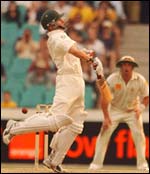
|

|

|
-- Saurabh Wahi
In my previous article I had explained the difference between a rating and a championship, and highlighted the fact that the biggest flaw with the ICC's 'Test Championship' is its ambiguity, i.e., it is a championship that works more like a rating system, or vice versa. In this article, I will now look at the system and analyze it first as a rating system and then as a championship.
As a rating system, the ICC's format fails mainly because it does not take into account factors such as strength of opposition and home advantage. Also, it does not take into account individual Test results. Hence, a 1-0 series victory at home is awarded as many points as a 3-0 or a 5-0 series victory away. This, in my opinion, is not an accurate reflection of the strength of a team, and hence its rating. This is evident if you consider that South Africa can move to the top of the ICC's 'Championship' table even if they draw the current home series against Australia.
 If the ICC's 'World Test Championship' is indeed a championship, then the method of awarding points, based on simple win-loss records cannot be faulted. Most other sporting championships work that way, and I don't see why this should be any different. The only argument could be awarding points for individual Test results as well as a series. Unfortunately, this is not possible, as the ICC's 10-year schedule does not mandate the number of Test matches to be played in a series. The only way to achieve that would be to normalize the results on individual Test matches, which would lead to a complicated system and must be avoided.
If the ICC's 'World Test Championship' is indeed a championship, then the method of awarding points, based on simple win-loss records cannot be faulted. Most other sporting championships work that way, and I don't see why this should be any different. The only argument could be awarding points for individual Test results as well as a series. Unfortunately, this is not possible, as the ICC's 10-year schedule does not mandate the number of Test matches to be played in a series. The only way to achieve that would be to normalize the results on individual Test matches, which would lead to a complicated system and must be avoided.
Given the nature of Test cricket, we know that it would be impossible to try and squeeze the championship in one year. Also, a knock-out tournament, or one based on a round-robin format is virtually out of question. In that case, it seems that the ICC had little choice, and their format for the 'World Test Championship' is correct. Or so it seems!
Let's look an alternative. What if we use the same rolling league basis to award points to teams, but have a 'Champion' at the end of every season. The team with the highest points is awarded the 'Championship' and the title stays till the end of the next season. This could be on a four-season rolling basis, with the points from the fourth season being dropped at the start of a new season.
Hence, the teams would start the 2002-2003 season, with points from the previous three seasons (1999-2000, 2000-2001 & 2001-2002). At the end of the season, the team with the highest points from seasons 1999-2000 thru' to 2002-2003 would be declared the 'ICC World Champion'. The new season, i.e. 2003-2004 would start with points of the 1999-2000 season being dropped, and so on.
This would address two of the problems with the ICC's current format:
 Firstly, it will be based only on results from the previous four years, and not ten. This would give teams, which are at the bottom of the table, a more realistic chance at the title then in the current format. Let's face it, currently teams in the bottom half of the 'championship' table have a very unrealistic chance to be crowned the World champions, hence the results of their Test series are, at least in the short term, still academic. Also, the schedule is not well spread out, and teams may have to wait a long time before they can rectify a 'bad' result. The 2-1 result from last year's series between India-Sri Lanka is valid till 2008, which is when India tours Sri Lanka again! So, if in future, the fortunes of the India team were to turn around, they would still be at a disadvantage because of this series, and would affect their chances for winning the championship. This would be somewhat similar (but reverse) of the situation the West Indies finds itself in.
Firstly, it will be based only on results from the previous four years, and not ten. This would give teams, which are at the bottom of the table, a more realistic chance at the title then in the current format. Let's face it, currently teams in the bottom half of the 'championship' table have a very unrealistic chance to be crowned the World champions, hence the results of their Test series are, at least in the short term, still academic. Also, the schedule is not well spread out, and teams may have to wait a long time before they can rectify a 'bad' result. The 2-1 result from last year's series between India-Sri Lanka is valid till 2008, which is when India tours Sri Lanka again! So, if in future, the fortunes of the India team were to turn around, they would still be at a disadvantage because of this series, and would affect their chances for winning the championship. This would be somewhat similar (but reverse) of the situation the West Indies finds itself in.
The second advantage would be that you would have a genuine title-holder, like most other sporting championships. Try to visualize the current series between Australia and South Africa being played under this new format. Assuming this to be the end of the season, it would mean that the winner of this series would be crowned the World champion. I am sure the competitiveness, and interest, would have been a lot different, and the result of the series would assume a different significance.
For this format to work accurately however, tours would have to be scheduled in such a way that teams would play each other every alternate season (home & away) in a four-year cycle. This would ensure an evenly spread and cyclic schedule thus ensuring that every new season would be exactly the same as the season it was replacing in the championship.
It would be na´ve for me to assume everyone to be in agreement with my method of determining the 'Test champion'. However, I am sure there should be little argument against having a more consistent schedule. After all, isn't this the case for all sporting championships, be it football, golf, tennis, Grand Prix motor racing, American baseball or the Olympics?
No matter what system the ICC adopts to determine the champion, a more consistent schedule is absolutely vital to give it more credibility and eliminate some of its inconsistencies. Besides, it will definitely be better for fans and players alike. India, not playing a single home series for eighteen months between January 2006 & October 2007, just does not make sense!
I know that all of you who agree with me must be wondering, "Yes, makes sense, but is it feasible to put together such a schedule?"
Hopefully, I will be able to answer this question in the subsequent articles.
Part I: The ideal ICC Test Championship
Next: In the remainder of this series, the author develops a so-called "Perfect" Word Championship schedule, and along the way, compares this schedule with the current ICC schedule, and addresses some of the issues highlighted above.
Editor's note: Rediff believes that like its own editorial staffers, readers too have points of view on the many issues relating to cricket as it is played.
Therefore, Rediff provides in its editorial section space for readers to write in, with their views. The views expressed by the readers are carried as written, in order to preserve the original voice.
However, it needs mentioning that guest columns are opinion pieces, and reflect only the feelings of the individual concerned -- the fact that they are published on Rediff's cricket site does not amount to an endorsement by the editorial staff of the opinions expressed in these columns.
Illustration: Uttam Ghosh